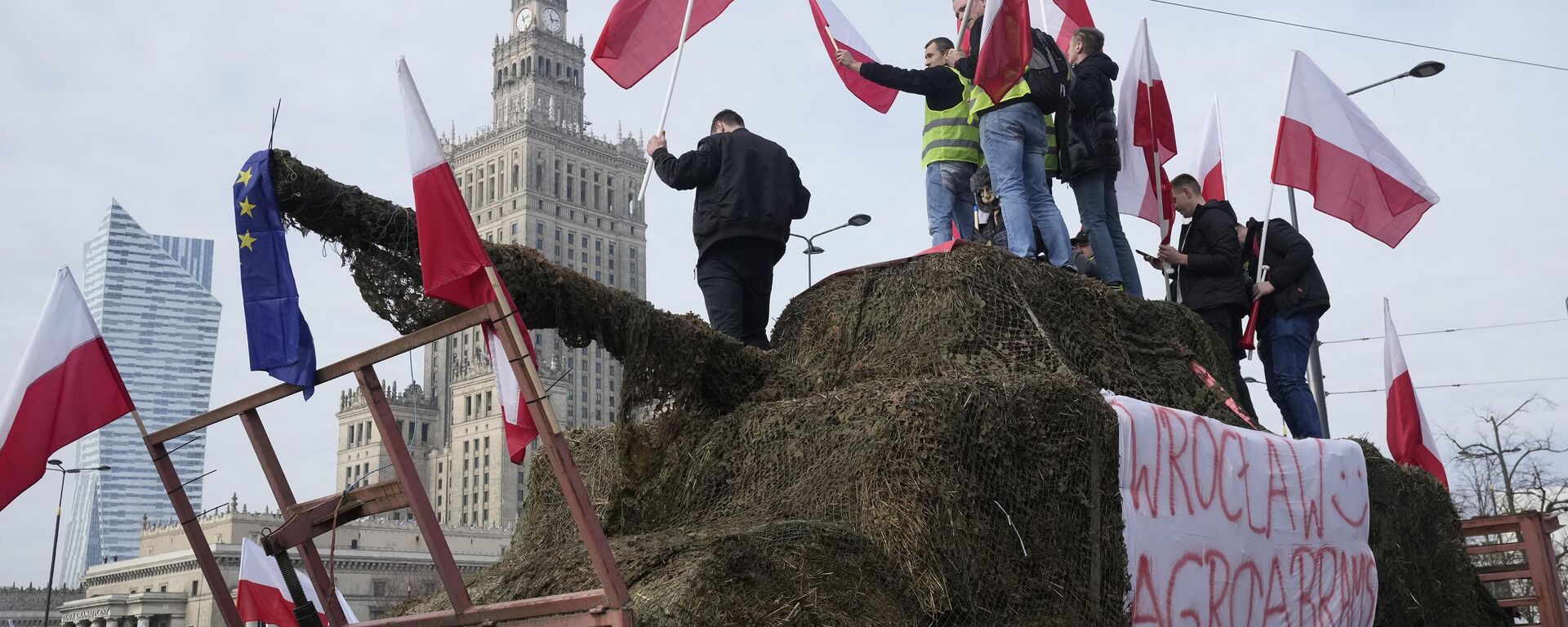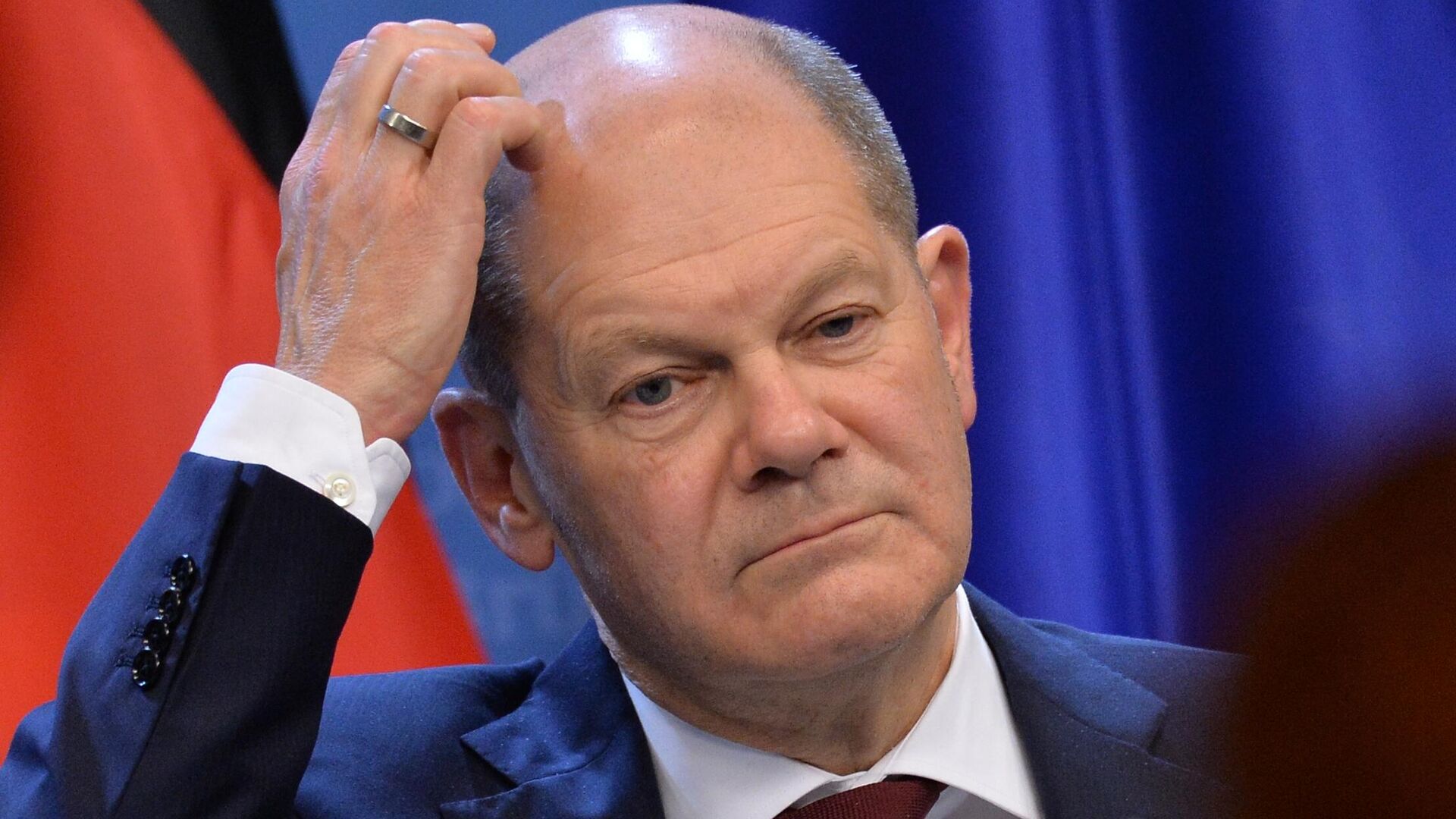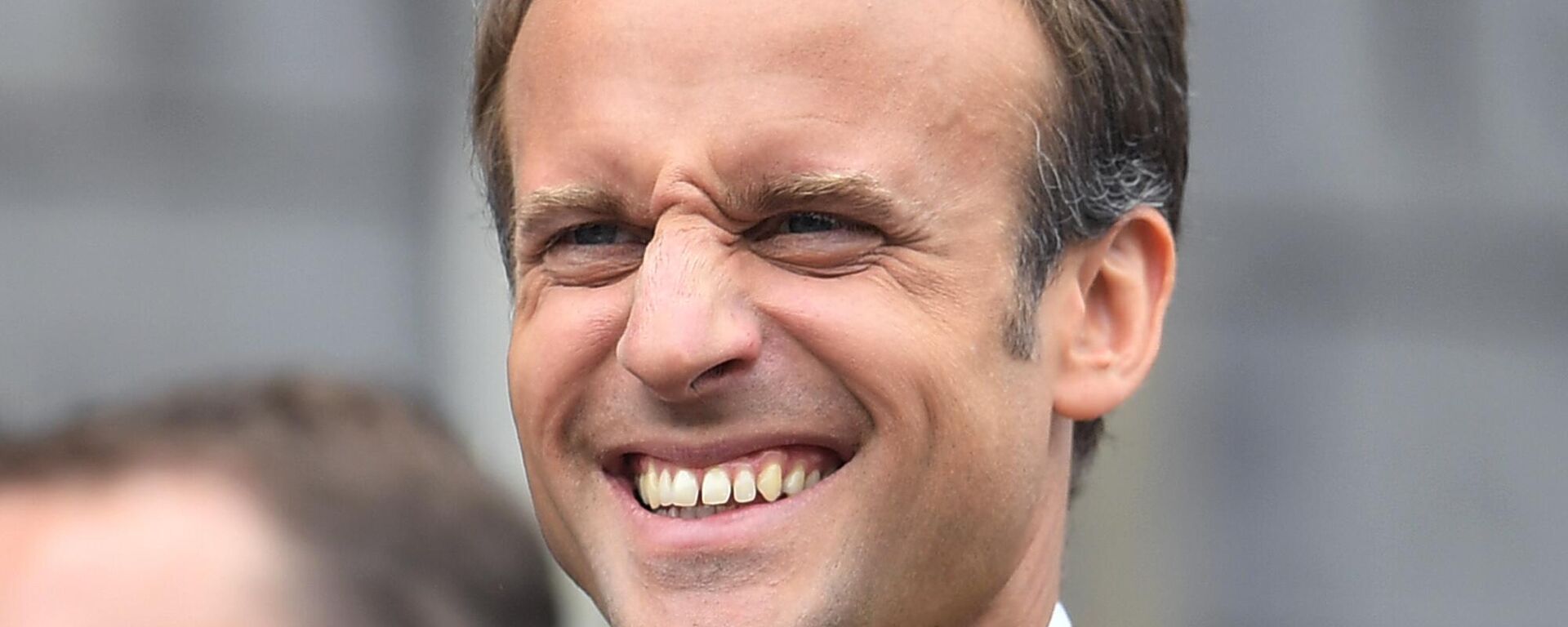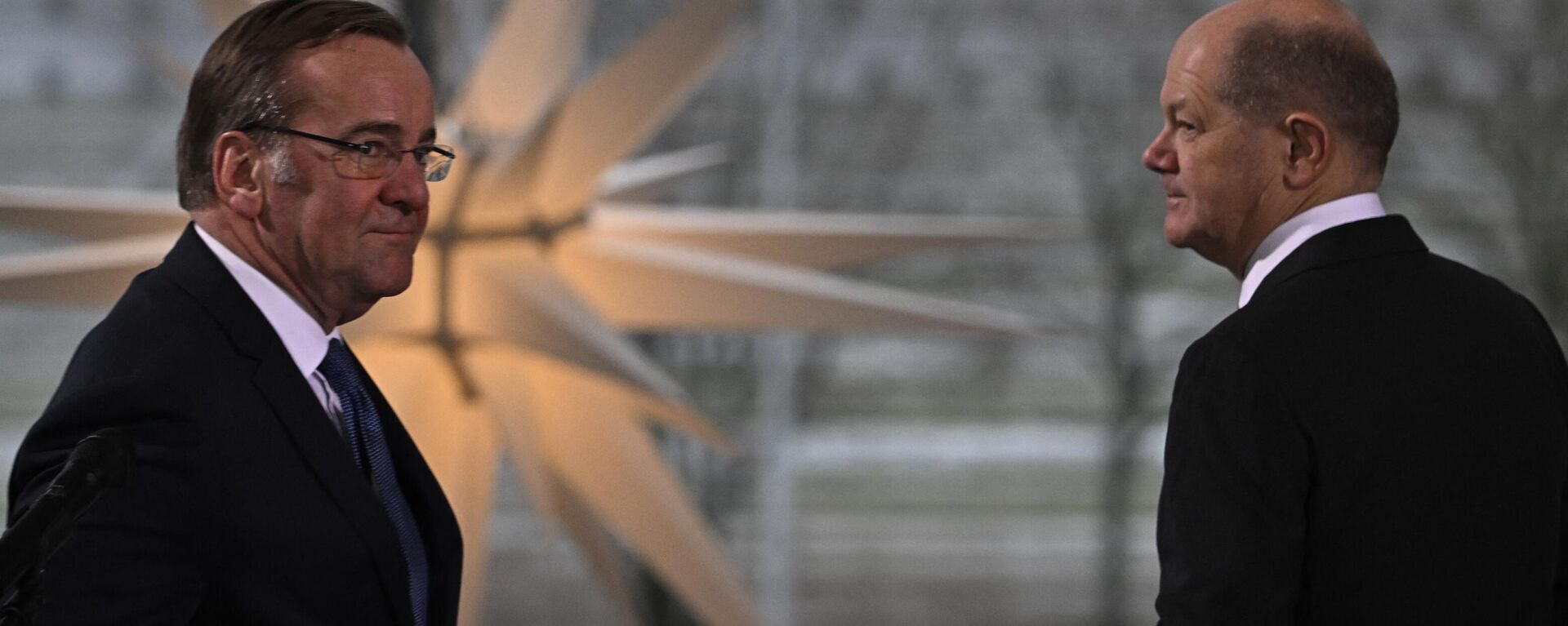https://sputnikglobe.com/20240607/radical-center-on-way-out-as-europeans-chafe-over-lack-of-ideological-flexibility-1118822973.html
Radical Center on Way Out as Europeans Chafe Over Lack of ‘Ideological Flexibility’
Radical Center on Way Out as Europeans Chafe Over Lack of ‘Ideological Flexibility’
Sputnik International
Europe’s political establishment seems intent on indefinitely supporting Ukraine’s proxy war against Russia, whether European citizens approve or not.
2024-06-07T04:37+0000
2024-06-07T04:37+0000
2024-06-07T04:37+0000
analysis
europe
emmanuel macron
annalena baerbock
george szamuely
ukraine
france
germany
european parliament
global policy institute (gpi)
https://cdn1.img.sputnikglobe.com/img/07e8/03/02/1117089119_0:113:2216:1360_1920x0_80_0_0_174bb3300113f3eef9df11c29b94a0f7.jpg
A curious, and perhaps seemingly contradictory, term has arisen for a style of politics recently en vogue throughout Europe.Politicians such as French President Emmanuel Macron and German foreign minister Annalena Baerbock have come to the fore promoting a style of politics often dubbed “radical centrism.” Such figures, placing themselves in opposition to various flavors of “populism,” cast themselves as pragmatic leaders who are nevertheless willing to engage in broad reform. Their policy is often typified by neoliberal economics, “green” politics, and unwavering support for Ukraine.But although such figures may be favored by mainstream media and establishment interests, they are increasingly unpopular among the European public.Szamuely specifically identified such politicians’ apparent support for “waging indefinite war in Ukraine,” which he pointed out was “clearly very unpopular in Europe.”The political commentator joined Sputnik’s The Final Countdown program Thursday to comment on the matter as polling ahead of this weekend’s European Parliament elections suggests self-styled anti-establishment parties stand to benefit amid a rejection of Europe’s drive towards conflict with Russia.“Obviously immigration is a major issue,” Szamuely observed. “Clearly the European governments haven't done anything about that. This has been a sore point for many years.”Germany has made headlines in recent months as the historical industrial powerhouse reports dismal growth figures, with the country’s economy set to expand by a mere 0.1% in 2024. Berlin has faced deindustrialization as Western sanctions barring it from access to low-cost Russian gas have dramatically increased operating costs.Critics have also claimed pro-environmental policy is a drag on growth, with farmers alleging that restrictions on the use of fossil fuels are cutting into their narrow margins. Europe has been rocked by farmers’ protests in response, with tractors flooding the streets in Lithuania, Poland, Romania, Greece, Germany, Italy, France and Belgium.Many of the protests are also driven by a rejection of free-trade policies intended to boost Ukrainian agricultural imports. The war in Ukraine more broadly is a matter of controversy for many Europeans, Szamuely noted, blaming “the kind of centrist liberalism which has been the dominant ideology over the past 10 years or so, as represented by seeing Macron in France and Olaf Scholz in Germany.”“Macron has been historically unpopular now for several years,” he said of the French President, who has repeatedly heightened tensions with Russia over the conflict with Ukraine. “And I think it's hard to see that he's making any kinds of adjustments. He still keeps talking about waging indefinite war in Ukraine. Now, this is clearly very unpopular in Europe, certainly unpopular in France and yet he continues doing this.”A recent poll by the French newspaper Le Figaro found that 68% of French people disagreed with comments by Macron about the possibility of sending Western troops to fight in Ukraine.“Whatever the outcome, I don't think very much is going to change in Europe,” Szamuely concluded. “There's gonna be all kinds of jockeying between various factions within the European Parliament, but I don't think policy will change very much.”
https://sputnikglobe.com/20240319/macron-trying-to-go-backwards-to-days-of-imperial-france-1117419288.html
https://sputnikglobe.com/20240228/we-have-become-our-own-enemy-polish-farmers-remarkable-protest-against-europes-self-destruction-1117028033.html
https://sputnikglobe.com/20240602/scholz-and-pistorius-bicker-over-how-to-make-germany-fit-for-war-as-ukraine-drains-coffers-1118744803.html
ukraine
france
germany
Sputnik International
feedback@sputniknews.com
+74956456601
MIA „Rossiya Segodnya“
2024
John Miles
https://cdn1.img.sputnikglobe.com/img/07e8/01/19/1116388787_0:0:1316:1316_100x100_80_0_0_77e70d36afd983012b1c5d38ddb84156.jpg
John Miles
https://cdn1.img.sputnikglobe.com/img/07e8/01/19/1116388787_0:0:1316:1316_100x100_80_0_0_77e70d36afd983012b1c5d38ddb84156.jpg
News
en_EN
Sputnik International
feedback@sputniknews.com
+74956456601
MIA „Rossiya Segodnya“
Sputnik International
feedback@sputniknews.com
+74956456601
MIA „Rossiya Segodnya“
John Miles
https://cdn1.img.sputnikglobe.com/img/07e8/01/19/1116388787_0:0:1316:1316_100x100_80_0_0_77e70d36afd983012b1c5d38ddb84156.jpg
europe radical center, macron centrist, european liberals support for ukraine war, european centrists ideological inflexibility, europe ukraine proxy war, macron scholz ukraine war, germany green party ukraine war
europe radical center, macron centrist, european liberals support for ukraine war, european centrists ideological inflexibility, europe ukraine proxy war, macron scholz ukraine war, germany green party ukraine war
Radical Center on Way Out as Europeans Chafe Over Lack of ‘Ideological Flexibility’
Europe’s political establishment seems intent on indefinitely supporting Ukraine’s proxy war against Russia, whether European citizens approve or not.
A curious, and perhaps seemingly contradictory, term has arisen for a style of politics recently en vogue throughout Europe.
Politicians such as French President Emmanuel Macron and German foreign minister Annalena Baerbock have come to the fore promoting a style of politics often
dubbed “radical centrism.” Such figures, placing themselves in opposition to various flavors of “populism,” cast themselves as pragmatic leaders who are nevertheless willing to engage in broad reform. Their policy is often typified by neoliberal economics, “green” politics, and unwavering support for Ukraine.
But although such figures may be favored by mainstream media and establishment interests, they are increasingly unpopular among the European public.
“They don't seem to have the ideological flexibility to realize how unpopular their policies are,” said Dr. George Szamuely, a senior research fellow at London’s Global Policy Institute. “So they continue tanking in the polls, but they don't seem to make any adjustments.”
Szamuely specifically identified such politicians’ apparent support for “waging indefinite war in Ukraine,” which he pointed out was “clearly very unpopular in Europe.”
The political commentator joined
Sputnik’s The Final Countdown program Thursday to comment on the matter as polling ahead of this weekend’s European Parliament elections suggests self-styled anti-establishment parties stand to benefit amid a rejection of Europe’s drive towards conflict with Russia.
“Obviously immigration is a major issue,” Szamuely observed. “Clearly the European governments haven't done anything about that. This has been a sore point for many years.”
“There's something else which is a feeling of economic decline,” he added. “Europe is not doing well economically. It's losing out relative to the rest of the world. And I think there's a feeling that something needs to be done.”
Germany has made headlines in recent months as the historical industrial powerhouse reports dismal growth figures, with the country’s economy set to
expand by
a mere 0.1% in 2024. Berlin has faced deindustrialization as Western sanctions barring it from access to low-cost Russian gas have dramatically increased operating costs.
Critics have also claimed pro-environmental policy is a drag on growth, with farmers alleging that restrictions on the use of fossil fuels are cutting into their narrow margins. Europe has been rocked by farmers’ protests in response, with
tractors flooding the streets in Lithuania, Poland, Romania, Greece, Germany, Italy, France and Belgium.Many of the protests are also driven by
a rejection of free-trade policies intended to boost Ukrainian agricultural imports. The war in Ukraine more broadly is a matter of controversy for many Europeans, Szamuely noted, blaming “the kind of centrist liberalism which has been the dominant ideology over the past 10 years or so, as represented by seeing Macron in France and Olaf Scholz in Germany.”

28 February 2024, 03:13 GMT
“Macron has been historically unpopular now for several years,” he said of the French President, who has repeatedly heightened tensions with Russia over the conflict with Ukraine. “And I think it's hard to see that he's making any kinds of adjustments. He still keeps talking about waging indefinite war in Ukraine. Now, this is clearly very unpopular in Europe, certainly unpopular in France and yet he continues doing this.”
A recent poll by the French newspaper Le Figaro found that
68% of French people disagreed with comments by Macron about the possibility of sending Western troops to fight in Ukraine.
“Similarly in Germany, when you enter this traffic light coalition – which is gung ho for this war in Ukraine – even though the German public really doesn't want to do it,” he continued. “The German public has made it absolutely clear in poll after poll that they don't want to get sucked into another war in the East. And yet it continues. So this is the problem, there doesn't seem to be the kind of ideological flexibility, a willingness to learn from past mistakes.”
“Whatever the outcome, I don't think very much is going to change in Europe,” Szamuely concluded. “There's gonna be all kinds of jockeying between various factions within the European Parliament, but I don't think policy will change very much.”






